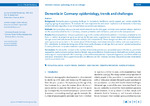Dementia in Germany: epidemiology, trends and challenges
Georges, Daniela
Rakusa, Elena
Holtz, Anna-Victoria
Fink, Anne
Doblhammer, Gabriele
Background: Dementia poses a growing challenge for individuals, healthcare, social support, and society amidst the
ongoing ageing of populations. To evaluate the care requirements and social implications of dementia in Germany,
reliable statistics regarding its current and future occurrence are necessary.
Methods: Using existing data sources and recent research results, this paper compiles and analyses relevant statistics
on the occurrence of dementia in Germany, presents protective and risk factors, and options for care provision.
Results: Recent projections indicate a potential surge in the number of dementia patients in Germany, predicted to rise
from 1.7 million at present to up to 3.0 million by the year 2070. Cognitive and motor deterioration and behavioural
changes associated with dementia lower the ability to live independently. These changes are often tied to social exclusion
and stigma and, particularly in the severe phase of the disease, necessitate extensive medical and care requirements.
This contributes to dementia being one of the most costly diseases at old age from an overall societal perspective.
Currently, there are no curative treatment options available.
Conclusions: To reduce the increase in the number of dementia patients and associated costs in the future, preventive
approaches, particularly promoting a healthy lifestyle, may prove effective. Simultaneously, the healthcare system, society,
and caregivers must prepare for the increasing number of dementia patients. Improved diagnostics, new forms of therapy,
and social innovations that support those who are affected and their relatives can help reduce the burden of dementia
and its associated costs.
Dateien zu dieser Publikation

